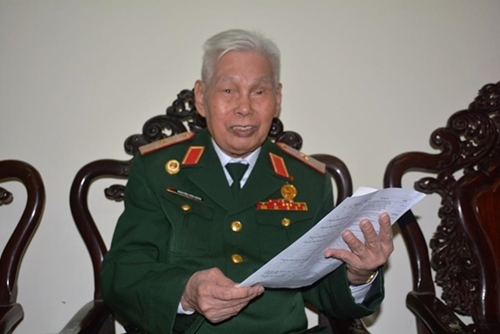General Ninh was one of the first officers who had an opportunity to celebrate the Lunar New Year festival with Truong Sa island troops. In 1975 when the country was liberated, Ninh (the then Deputy Head of the Bureau of Arms and Services under the Department of Warfare) was sent to Truong Sa to grasp the real situations at sea and settle related issues.
    |
 |
|
Major General Nguyen Van Ninh sharing his memories of Truong Sa |
Holding his diary in his hand, General Ninh pointed at an old faded photo and said, “This photo of me was taken more than 40 years ago. Truong Sa troops used to be skinny because of seasickness.”
Working on islands for years, Ninh understood better than anyone the hardship facing troops and the lack of vegetables and clean water. Troops used to eat seaweed to make them feel full.
Life of troops on DK1 Platforms was not less arduous than that of those on Truong Sa islands. During one year-service on the platforms, servicemen faced a lot life-threatening circumstances due to big storms. In spite of harsh conditions, troops on the platforms showed their determination to firmly safeguard national sovereignty over seas and islands. “I am extremely happy and proud of naval troops,” Ninh said.
The old army officer took a photo of General Le Duc Anh (the then Defense Minister) and a working delegation on Truong Sa island. The photo evoked his memories of a swearing-in ceremony which was held on the occasion of the 33rd anniversary of the foundation day of the Vietnam People’s Navy on May 7, 1988.
In the morning of the day, in a solemn atmosphere, General Le Duc Anh took an oath as follows: “We do solemnly swear to the souls of our ancestors and fallen soldiers and people across the country that we will firmly protect our beloved Truong Sa archipelago, a sacred and integral part of our nation.”
From 1975 to 1990, General Ninh frequently visited Truong Sa three or four times a year, but visits prior to Lunar New Year Festival were the most memorable.
The general took his first Lunar New Year celebration with troops on Song Tu Tay Island as an example. He went on, on the afternoon of the last day of lunar December, the island become bustling as troops were in a hurry to prepare ingredients for Chung cake (traditional Vietnamese glutinous rice cake). Chung cakes made by troops on the island were different from traditional cakes which are normally wrapped in phrynium placentarium leaves. They were covered by barringtonia asiatica leaves because of an insufficient supply of phrynium placentarium leaves from the mainland.
On the New Year’s Eve, troops gathered around a boiling pot of Chung cakes, sang together, shared their stories, and enjoyed the New Year celebration atmosphere in the mainland through a cassette radio. Because of a poor connection, they found difficult to listen to the news. However, when the connection was good, all of them were excited to the voices of people from the mainland.
A young soldier from Nghe An province bursted into tears when listening to women’ and children’s voices on the radio. The man had been staying on the island for three years. When he left his home, his wife was pregnant, Ninh remembered.
The New Year’s Eve Party on the island ended late. After listening to the State President’s New Year message, troops double-checked the area and gave encouragements to those on duty that night.
Concluding his stories of Truong Sa and his first Lunar New Year celebration on Song Tu Tay island, Ninh repeated sentences of a young soldier who was on guard on that New Year’s Eve, “I am from Ha Tinh province. I miss my family, but I promise to fulfil military service.”
His words touched my heart and are always in my mind, Ninh said.
Translated by Tran Hoai